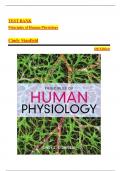Test Bank for Principles of Human Physiology 6th Edition by Stanfield
Test Bank for Principles of Human Physiology 6th Edition by Stanfield
Written for
- Institution
- Principles of Human Physiology 6th Edition
- Course
- Principles of Human Physiology 6th Edition
Document information
- Uploaded on
- June 10, 2023
- Number of pages
- 1139
- Written in
- 2022/2023
- Type
- Exam (elaborations)
- Contains
- Questions & answers
Subjects
-
6th edition
-
test bank for principles of human physiology 6th e
-
principles of human physiology
Content preview
Also available in package deal


